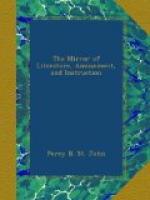The grounds attached to the castle, as I before observed, though so little attended to, are still beautiful. Walks, which a few years since were neat and trim, are now so overrun with brambles and wild flowers as to be passed with difficulty. Much wood has also been cut down, and the statues, so ridiculously enumerated in a popular song, removed. A picturesque bridge too, which led to the castle, has been swept away by the wintry floods, and, with the exception of a small dell called the Rock Close, every thing seems changed for the worse. In this romantic spot nature and art (a combination rather uncommon in pleasure-grounds) have gone hand in hand. Advantage has been taken of accidental circumstances to form tasteful and characteristic combinations; and it is really a matter of difficulty at first to determine what is primitive, and what the produce of design. The delusion is even heightened by the present total neglect. You come most unexpectedly into this little shaded nook, and stand upon a natural terrace above the river, which glides as calmly as possible beneath. Here, if you feel inclined for contemplation, a rustic couch of rock, all festooned with moss and ivy, is at your service; but if adventurous feelings urge you to explore farther, a discovery is made of an almost concealed, irregularly excavated passage through the solid rock, which is descended by a rude flight of stone steps, called the “Witches Stairs,” and you emerge sul margine d’un rio, over which depend some light and graceful trees. It is indeed a fairy scene, and I know of no place where I could sooner imagine these little elves holding their moonlight revelry.
A short distance to the south-west of the castle is a lake, said to abound with a species of leech. It does not afford one good subject for the pencil, being without islands, the margin swampy, and the adjacent trees planted with too much attention to regularity. It is a very generally believed tradition that, before Blarney surrendered to King William’s forces, Lord Clancarty’s plate was made up in an ’oaken chest, which was thrown into this lake, and has not since been recovered; nor does this appear improbable, as I understand repeated attempts have in vain been made to drain it. In 1814, the late Mr. Milliken, whose well-known song of “the Groves of Blarney” has identified his memory with the place, gave me a clumsy silver ring for the finger, which had been taken out of the lake by a boy who was fishing in it.
Since I am on the subject of discoveries, it may be worth notice that, in a quarry close to the castle, where some men were working, we picked up several human bones, and that one of the labourers informed us so many as twenty horse loads of these bones had been thrown into the lake; he also spoke of two or three spear-heads being found with them. Groats and pennies of the Edwards and Henries have frequently been dug up here; but I believe never in any quantity.




